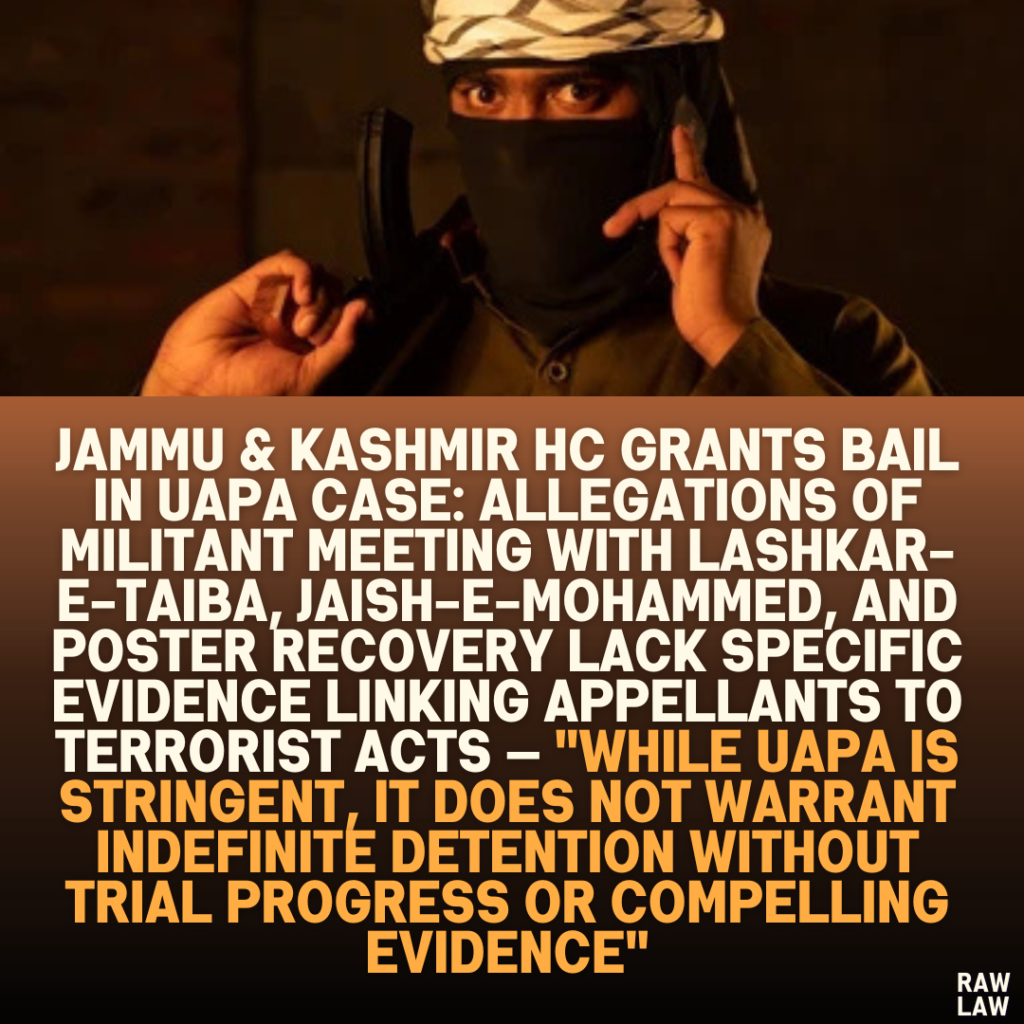Court’s Decision
The High Court of Jammu & Kashmir and Ladakh granted bail to the appellants, overturning the trial court’s orders. The court emphasized the lack of prima facie evidence directly linking the appellants to the alleged terrorist activities. It highlighted that mere possession of posters and allegations of attending a meeting with militants were insufficient to deny bail. Given that the appellants had been in custody for over five years and the trial was far from conclusion, the court deemed it appropriate to grant bail under stringent conditions.
Facts
- Background of the Case:
- The appellants were accused of participating in a meeting allegedly convened by militants affiliated with banned terrorist organizations such as Lashkar-e-Taiba and Jaish-e-Mohammed.
- Posters urging the shutdown of businesses, traffic, and government offices in Sopore were allegedly recovered from the appellants’ residences following disclosures during the investigation.
- Charges:
- The appellants were charged under:
- UAPA Sections 13, 20, and 39: Pertaining to unlawful activities, membership in a terrorist organization, and support for terrorism.
- RPC Sections 120B and 506: Conspiracy and criminal intimidation.
- The prosecution claimed that these actions contributed to incidents of violence in Sopore.
- The appellants were charged under:
- Prolonged Detention:
- The appellants had been detained for more than five years without trial resolution.
Issues
- Do the allegations meet the threshold of “prima facie true” under Section 43D(5) of the UAPA to justify continued detention?
- Does prolonged incarceration without trial progress violate the appellants’ right to liberty under constitutional principles?
Petitioner’s Arguments
- Limited Allegations:
- The accusations were confined to possession of posters, which were insufficient to establish terrorist activity or intent.
- No direct evidence linked the appellants to violent acts or their planning.
- Right to Liberty:
- Detention for over five years without trial progress was a violation of the appellants’ fundamental rights.
- Misinterpretation by the Trial Court:
- The trial court failed to weigh the severity of allegations against the appellants’ prolonged custody and absence of direct evidence.
Respondent’s Arguments
- Severity of Allegations:
- The appellants participated in a meeting with militants, which allegedly led to terrorist activities.
- Posters recovered from their residences supported a shutdown call in favor of banned organizations.
- UAPA Provisions:
- The stringent provisions of the UAPA require detention if allegations are prima facie true.
Analysis of the Law
- Section 43D(5) of UAPA:
- This provision denies bail if allegations are deemed “prima facie true.”
- The court clarified that the term “prima facie true” does not mean conclusive proof but requires reasonable evidence connecting the accused to the alleged offenses.
- Right to Liberty:
- The court balanced the accused’s fundamental rights against national security concerns.
- It observed that prolonged detention without substantial trial progress undermines constitutional rights.
- Section 27 of the Evidence Act:
- The court scrutinized the admissibility of disclosures leading to the recovery of posters.
- It concluded that the disclosures and recoveries were insufficiently connected to justify denial of bail.
Precedent Analysis
- Vernon v. State of Maharashtra (2023):
- The Supreme Court granted bail under UAPA, holding that restrictions under Section 43D(5) are less stringent than those under the NDPS Act.
- Gurwinder Singh v. State of Punjab (2024):
- Defined “prima facie true” as requiring reasonable grounds for belief in the allegations, not mere suspicion.
- Ashim Kumar Haranath v. NIA (2021) and Yedala Subba Rao v. Union of India (2023):
- Highlighted the significance of prolonged incarceration in bail considerations, particularly when trials are unlikely to conclude soon.
Court’s Reasoning
- Insufficiency of Evidence:
- The court found that the allegations of attending a militant meeting and recovering posters lacked clear, specific evidence linking the appellants to terrorist acts.
- Prolonged Detention:
- Five years of custody without trial progress violated the appellants’ right to a fair trial and liberty.
- Trial Court’s Error:
- The trial court misapplied the “prima facie true” standard, failing to recognize the lack of strong evidence against the appellants.
- Balancing Rights and Security:
- While UAPA is stringent, it does not warrant indefinite detention without trial progress or compelling evidence.
Conclusion
The court allowed the appeals and granted bail with the following conditions:
- Submission of a bail bond of ₹1,00,000 each.
- Restriction on leaving Jammu & Kashmir without prior permission.
- Mandatory monthly reporting to the local police station.
- Surrender of passports.
- Non-tampering with prosecution evidence.
The court clarified that its observations would not impact the trial’s merits.
Implications
- Fair Trial Principle:
- Reinforces the judiciary’s role in safeguarding constitutional rights, even under stringent laws like UAPA.
- Prolonged Detention:
- Highlights the importance of timely trial resolution, especially in cases involving serious allegations.
- Balancing Security and Rights:
- Demonstrates the court’s effort to balance national security with individual liberties, emphasizing evidence-based justice.
- Judicial Precedent:
- Sets a benchmark for granting bail in cases involving prolonged detention and weak evidence under UAPA.
